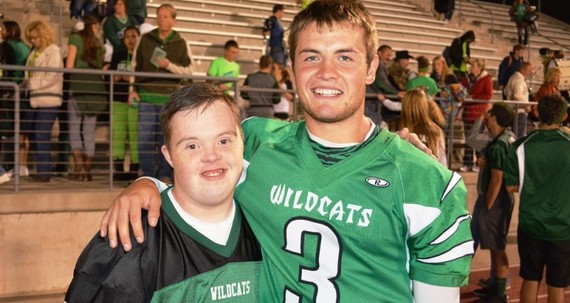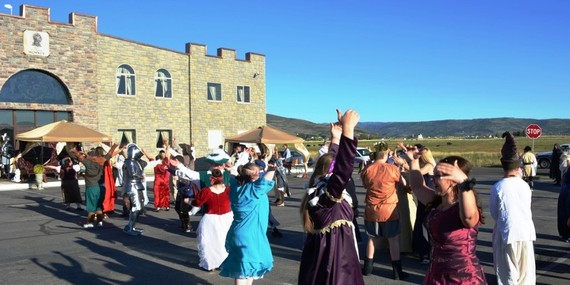Because October is National Down Syndrome Awareness month, my son, Jack, and I decided to share some thoughts with you. For those of you who don't know him, Jack is 19 years old and he has Down syndrome. He is one of my mentors. Few people have taught me more than he has. Jack is also one of my best buddies, but that only puts me somewhere on a long and distinguished list.
As parents, my wife and I have always looked at Jack's diagnosis of Down syndrome as a tool to research how to help him the most, rather than a definition of what's wrong with him. Jack is genetically different from most people. But genetically speaking, we are all different from each other. I would hate to be the one to decide where differences in genetics should begin to be defined as "wrong." Dark hair and brown eyes are only two genetic features that have been defined as "wrong" in certain times and places. Let's just say that for our family and my son's friends, there's nothing wrong with Jack.
Some have accused me of promoting a stereotype of Down syndrome because Jack is a very positive and happy guy. He does have occasional bad days and he does get angry. But those events are generally short-lived. Jack loves to smile, laugh, tease, and make people happy. However, that is not a result of Down syndrome. Jack and I know people who have Down syndrome who are not generally pleasant and happy.
It seems to me that though Down syndrome doesn't assign personalities, it often removes inhibitions that many of us feel in letting those personalities come through on the clearest channel. I know very few people who have Down syndrome who are ashamed of who they are, or are apprehensive about letting you see them in their unvarnished version. In fact, often, that's all you get. For Jack, that means you usually see unbridled happiness. For others with Down syndrome, it may bring a preponderance of negatively expressed social interactions.
I would say that my experience around people with Down syndrome has led me to believe that while Down syndrome doesn't give anyone a personality, it may well enhance or intensify the personality that distinctly belongs to the person, rather than the condition. That was the biggest thing I wanted to share with you for Down Syndrome Awareness month, but there are some other things that Jack and I want you to know about Down syndrome and our friends who have it. Jack is a little weak when it comes to verbal interaction, but I think you'll enjoy some of his thoughts. (Some parts of our conversation were removed for continuity.)
John- What should I say to someone who has Down syndrome?
Jack- Congratulations.
John- (After chuckling) It's good to have Down syndrome?
Jack- Yup.
John- What do people who have Down syndrome like to do for fun?
Jack- Go to Lagoon (a local amusement park).
John- What is the best ride?
Jack- The mouse (Wild Mouse).
John- Do your friends who have Down syndrome like Lagoon too?
Jack- Yeah! Autumn loves the mouse.
John- Where do people who have Down syndrome like to go on vacation?
Jack- California. Stay at the beach. Swim in the pool, like Free Willy.
John- What do people who have Down syndrome like?
Jack- Ummm... Music.
John- What kind of music?
Jack- Ummm, Brooks and Dunn. Toby Keith. Toby Keith Christmas music.
John- What is the favorite music at the Kingdom Ball? (The Kingdom Ball is a local, annual, renaissance themed dinner-dance for teens and young adults with Intellectual Disabilities.)
Jack- Brooks and Dunn. No. YMCA! (The participants love the hand gestures they get to do while dancing to the old Village People hit. It is by far, the most requested song.)
John- What else should we tell people about Down syndrome?
Jack- Ummm... I like football. Denver Broncos. It's good. My friends at school, we sing songs.
John- Are there other things I should tell people about Down syndrome?
Jack- I can say good morning, Princess, and kiss my married.
John- Can people who have Down syndrome get married? Do you want to get married?
Jack- Yeah. (Giggles sheepishly)
John- What else should we tell people about Down syndrome?
Jack- Yeah. (Lots of jabbering and trailing off. Change of subject.)
There's a point to our conversation. I might as well have replaced the condition of Down syndrome with green eyes, big feet or 32 inch inseams. Jack doesn't see a point to segregating people out for any condition. People are people. They like the same things. His trailing off and changing the subject were also significant. He's not comfortable when he thinks his condition is being used to say that he's different. Who is comfortable in such a situation?
There is a bit of a paradox here. Jack is happiest when people do treat him a little bit differently, on occasion. Jack was voted in as Prom King his junior year. It's one of the highlights of his life. But Jack believes he was voted in as Prom King because his friends thought he was most deserving of that honor. I'm not convinced there isn't some truth to that belief. But Jack is also quite proud of the fact that he took fifth place in a high school track meet. He congratulated two athletes for doing a good job, even though they finished in sixth and seventh place, right behind him, in a seven person race. Both athletes gave up qualification times so that someone who was doing his best would have reason to believe in himself a little bit more.
People who have Down syndrome are just like the rest of us in that they don't want to be viewed as different. They want their identifiers to be those of brother, son, daughter and friend (perhaps even husband or wife), rather than a genetic condition. And also like the rest of us, they want to achieve and do well. There is no dishonor in validating their self-worth and boosting them from time to time, as long as we do it with an invisible hand.
Follow John M. Simmons on his blog

